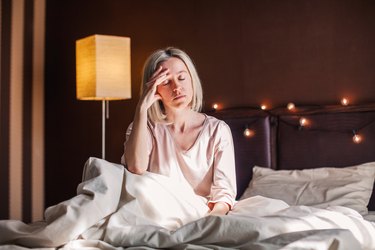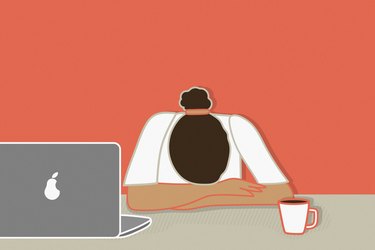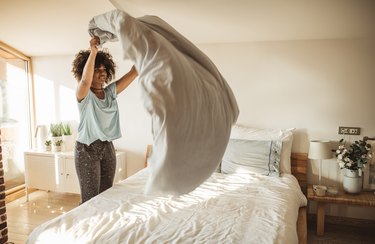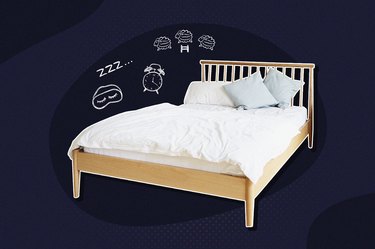
It's 3 a.m. and your eyes pop open. Suddenly, you're wide awake. Like clockwork, you regularly rouse from sleep at the same time every night (whether it's 3 a.m. or not).
If this is you, you may be wondering, "What gives?"
Video of the Day
Video of the Day
While nighttime awakenings are pretty common and usually no big deal, sometimes they can indicate a more serious sleep disorder or health issue.
Here, Vishesh K. Kapur, MD, MPH, professor in the division of pulmonary, critical care and sleep medicine at the University of Washington, explains why you keep waking up at 3 a.m., and what you can do to get back to sleep.
1. Your Body Is Conditioned
Humans are creatures of habit. That means, once you lock in a certain behavior, it can be challenging to break. So, if you once had a reason to wake up at 3 a.m. (say, you worked the graveyard shift at your job or you cared for an infant), your body might just be accustomed to this wake schedule.
While the research isn't conclusive on this theory, Dr. Kapur agrees it's a possibility.
"I am not sure that the science behind this is known — and whether this is truly conditioning — but my guess is that the brain and body has awareness of important duties and is able to cause wakefulness at times when needed," he says.
2. You’re Sleeping Lightly at This Time
Throughout the night, you cycle through different phases of sleep. Spontaneous waking is more likely depending on which phase you are in.
"Much of sleep debt (what helps keep you asleep) is paid off in the first third of the night when we are in deep non-REM sleep (i.e., slow wave sleep)," Dr. Kapur says. "This means there is less sleep debt to help maintain sleep later in the night."
In other words, once your body gets what it needs, you'll have less deep sleep as the night progresses. So by the time 3 a.m. rolls around, you might be in a lighter sleep stage — REM sleep.
In fact, in REM sleep — the stage when most dreaming happens — you even have increased brain activity (similar to waking levels), faster breathing and a rise in heart rate and blood pressure, according to the Cleveland Clinic.
3. You Have Sleep Apnea
Sleep apnea — a sleep disorder characterized by periods of interrupted breathing — could be the reason for your 3 a.m. wakefulness.
"Sleep apnea can cause awakenings at any time of night, but perhaps it's more likely later in the night because sleep is lighter," Dr. Kapur says. Indeed, "sleep apnea is more common and severe" during REM sleep, he says.
These sudden stirrings can be accompanied by feelings of gasping or choking. Additional signs of sleep apnea include, per the Cleveland Clinic:
- Snoring
- Daytime sleepiness or fatigue
- Restlessness during sleep
- Dry mouth or sore throat upon awakening
- Cognitive impairment, such as trouble concentrating, forgetfulness or irritability
- Mood disturbances (depression or anxiety)
- Night sweats
- Frequent nighttime urination
- Sexual dysfunction
- Headaches
Warning
If you’re experiencing any of the above symptoms, see a sleep specialist who can properly assess, diagnose and treat your condition.
Left unchecked, sleep apnea can set in motion some serious health problems such as high blood pressure, stroke, cardiomyopathy (enlargement of the heart muscle), heart failure, diabetes and heart attacks, according to the Cleveland Clinic.
4. You’re Getting Older
Your 3 a.m. awakenings could be associated with your age.
"There is a tendency to not be able to sleep as long (or maintain sleep) as we get older," Dr. Kapur says.
That's because older folks spend fewer hours in deep sleep and, on average, stir from slumber three to four times per night, according to the U.S. National Library of Medicine (NLM).
Making matters worse, certain sleep-sabotaging issues such as frequent urination, discomfort or pain related to chronic health problems and sleep disorders — including insomnia and restless legs syndrome (a condition that causes an uncontrollable urge to move the legs) — tend to be common complaints in seniors, per the NLM.
5. You’re Drinking Too Much Alcohol (or Drinking Too Close to Bedtime)
While some booze before bed might initially help you relax, it can affect your sleep and lead to you waking up in the middle of the night.
"As alcohol is metabolized and its level [in the body] decreases, sleep is disrupted," Dr. Kapur says.
And the more you drink, the greater the disruption. Case in point: A 2013 review in Alcoholism: Clinical and Experimental Research concluded that high doses of alcohol can interrupt and reduce REM sleep and disturb slow wave sleep.
But it's not just the amount of alcohol you drink. When you drink matters, too. Indeed, drinking alcohol within four hours of bedtime brought on an increase in fragmented sleep, according to an August 2019 study in Sleep.
6. You Have a Circadian Rhythm Disorder
If you're struggling with daily sleep disruptions at 3 a.m., you could be dealing with a circadian rhythm disorder. Also called sleep-wake cycle disorders, circadian rhythm disorders happen when your internal clock becomes misaligned with your environment, according to the National Heart, Lung and Blood Institute (NHLBI).
While this type of sleep problem can be temporary (think: your sleep habits are temporarily disturbed due to travel), circadian rhythm disorders can also be chronic conditions caused by aging, genetics or a medical issue, per the NHLBI.
"Individuals with advanced sleep phase disorder will have a body clock that favors an early bedtime and wakeup time," Dr. Kapur says. This explains why your eyes might flicker open at 3 a.m.
In addition to frequent awakenings and poor sleep quality, other symptoms of a circadian rhythm disorder may involve, per the NHLBI:
- Extreme daytime sleepiness
- Decreased alertness
- Problems with memory and decision-making
Tip
If your sleep disruptions are affecting daily functioning and quality of life, see a doctor who may recommend you undergo a sleep study. You may be living with a circadian rhythm disorder.
7. You Have a Nightmare Disorder
We've all been startled from sleep by an unsettling dream at one point. But if your sleep is consistently disrupted with bad dreams, you might have a nightmare disorder.
People with nightmare disorders may experience nightmares several times a night, which usually happen during the second half of the evening, according to the Mayo Clinic.
That's because, like other types of dreams, "nightmares are more likely to occur later in the sleep period when more REM sleep occurs," Dr. Kapur says.
Along with frequent bad dreams, signs of a nightmare disorder include, per the Mayo Clinic:
- Major distress or impairment during the day (anxiety, persistent fear or bedtime anxiety)
- Problems with concentration or memory (or you can't stop thinking about images from your dreams)
- Daytime sleepiness, fatigue or low energy
- Problems functioning at work, school or in social situations
- Behavior problems related to bedtime or fear of the dark (typically found in children)
Though rare, nightmare disorders may be associated with factors such as stress, anxiety or other mental health issues, trauma, sleep deprivation and the use of certain medications or substances (such as alcohol or recreational drugs), according to the Mayo Clinic.
Tip
Nightmares are scary, and you don't have to navigate them on your own. Start by seeing your doctor to rule out any underlying medical conditions or medications that might be contributing to your nightmares. If stress, anxiety or another mental health issue is the root cause, see a therapist who can assist you in processing and better managing these feelings, and, hopefully, help you stop the nightmares.
What Can You Do to Prevent Nighttime Awakenings?
While avoiding 3 a.m. awakenings may not always be possible, here are some things you can do to ensure better quality sleep, per the NLM:
- Avoid stimulants such as caffeine for at least three to four hours before bed
- Don't take naps
- Exercise at regular times each day, but not within three hours of your bedtime
- Avoid too much stimulation, such as violent TV shows or computer games, before sleep
- Practice relaxation techniques at bedtime
- Do not watch television or use your computer, cell phone or tablet in the bedroom
- Try to go to bed at the same time every night and wake at the same time each morning
- Use the bed only for sleep or sexual activity
- Avoid alcohol and tobacco products, especially before sleep
If you wake up and then struggle to fall back asleep, Dr. Kapur suggests the following best practices:
- Don't check your phone (you don't want your brain to think it's time to wake up)
- Get out of bed and do something relaxing until you feel sleepy again, like light reading, deep breathing or meditation
- Avoid stimulating activities like watching TV or turning on any bright lights
When to See a Sleep Expert
If your nightly sleep disturbances cause you distress or start to interfere with your work performance, concentration or memory, consult with a sleep expert, per the Cleveland Clinic.
A specialist can help you get to the bottom of the problem and create a treatment plan for a better sleep.
- Cleveland Clinic: “Sleep Basics”
- Cleveland Clinic: “Sleep apnea”
- Alcoholism: Clinical and Experimental Research: “Alcohol and sleep I: effects on normal sleep”
- Sleep: “Evening intake of alcohol, caffeine, and nicotine: night-to-night associations with sleep duration and continuity among African Americans in the Jackson Heart Sleep Study”
- National Library of Medicine: “Aging changes in sleep”
- Mayo Clinic: “Nightmare disorder”
- Cleveland Clinic: “Why Do You Always Wake Up at 3 a.m.?”
- National Institute of Health: "Slow Wave Sleep: Does it Matter?"
Was this article helpful?
150 Characters Max
0/150
Thank you for sharing!
Thank you for your feedback!
Is this an emergency? If you are experiencing serious medical symptoms, please see the National Library of Medicine’s list of signs you need emergency medical attention or call 911.





